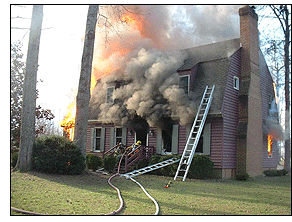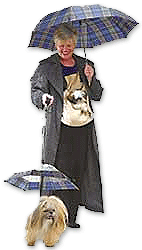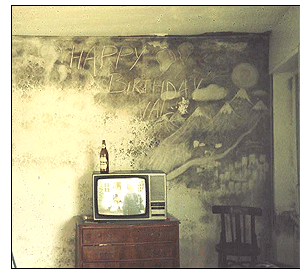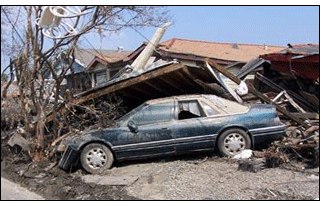Betting the House -- Homeowners
Insurance Exposed

The state does not require homeowners insurance. If you're a high stakes gambler or just stupid, you can legally own a home without any insurance whatsoever. Unless you have a mortgage. If you still owe money on your home (who doesn't?) your lender will want protection for that little slice of collateral you call home.
Simply put, homeowners insurance provides financial protection against inevitable disasters. Homeowners insurance is a "package" policy. It covers damage to your property plus your liability for injuries and property damage you or members of your family cause to others. That means if your prize Weimaraner, Spot, chews the leg off a neighbor's chair or a leg off his body, you're covered.
 Your policy covers damage caused by most disasters but there are exceptions. Floods and earthquakes require their own separate policies. Obviously, you should only add those coverages if you live in a flood plane or on a fault line. In Texas, you can buy separate policies to cover loss from landslides or sinkholes. Find out if the land you live on is likely to slide or sink, and protect yourself accordingly.
Your policy covers damage caused by most disasters but there are exceptions. Floods and earthquakes require their own separate policies. Obviously, you should only add those coverages if you live in a flood plane or on a fault line. In Texas, you can buy separate policies to cover loss from landslides or sinkholes. Find out if the land you live on is likely to slide or sink, and protect yourself accordingly.
Your policy won't likely include coverage for
- flooding due to natural causes
- earthquake aftershocks and mudslides
- loss due to government actions like code requirements, condemnation, demolition or zoning change
- loss due to the neglect of the insured to protect or preserve property in a loss
- war or nuclear peril (domestic or foreign)
- loss from maintenance neglect, i.e., termite infestation
- intentional loss (you break it, you pay for it).
Damage from mold may be limited or not covered on your policy and it's also icky. Try to prevent it.
The Standard Homeowners Policy
A standard homeowners insurance policy includes four types of protection:
- Coverage for the structure of your home.
- Coverage for your personal belongings.
- Liability protection.
- Walkin' around money for substitute housing and furniture in the event you are temporarily unable to live in your home because of a fire or other insured disaster.
 The structure of your house - This part of your policy pays to repair or rebuild your home if it's damaged or destroyed by fire, hurricane, hail, lightning or other disaster listed in your policy. Again, be aware that it doesn't cover damage due to flood, earthquake or routine wear and tear. The key when purchasing coverage for the structure of your home is buying enough to rebuild it. Greta can help you determine this.
The structure of your house - This part of your policy pays to repair or rebuild your home if it's damaged or destroyed by fire, hurricane, hail, lightning or other disaster listed in your policy. Again, be aware that it doesn't cover damage due to flood, earthquake or routine wear and tear. The key when purchasing coverage for the structure of your home is buying enough to rebuild it. Greta can help you determine this.
Most standard policies also cover structures that are detached from your home such as a detached garage, tool shed, gazebo or (if you live in East Texas) privy. Generally, these structures are covered for about 10% of the amount of insurance you have on the structure of your home. If that's not enough, talk to Greta about boosting coverage.
Your personal belongings - Your furniture, clothes, sports equipment, marital aids (don't believe I'd have claimed that) and other personal items are covered if they are stolen or destroyed by fire, hurricane or other insured disaster. Most companies provide coverage for 50% to 70% of the amount of insurance you have on the structure of your home. If you have $100,000 worth of insurance on the structure of your home, you would have between $50,000 to $70,000 worth of coverage for your belongings. You can determine if this is enough coverage by conducting a home inventory.
This part of your policy includes off-premises coverage. That means your belongings are covered anywhere in the world (unless you waived off-premises to save a few pesos). Take your refrigerator to France? It's protected. Some companies limit off-premises to 10% of the amount of personal belongings coverage so don't take an expensive appliance overseas. Many companies include up to $500 of protection for unauthorized use of your credit cards.
 Pricey items like jewelry, furs and silverware are covered, but you know the company is going to weasel on you when they're stolen. In general, you get between $1,000 to $2,000 for all of your jewelry and furs. If you want full recovery, you'll need to purchase a special endorsement or "floater" and insure the item for their appraised value. Coverage includes “accidental disappearance,” meaning you recover if you brainlessly lose that item. And there is no deductible.
Pricey items like jewelry, furs and silverware are covered, but you know the company is going to weasel on you when they're stolen. In general, you get between $1,000 to $2,000 for all of your jewelry and furs. If you want full recovery, you'll need to purchase a special endorsement or "floater" and insure the item for their appraised value. Coverage includes “accidental disappearance,” meaning you recover if you brainlessly lose that item. And there is no deductible.
Standard homeowners also covers trees, plants and shrubs. You're typically covered for 5% of the structure value—up to about $500 per item. Perils covered are theft, fire, lightning, explosion (the dreaded exploding philodendron), vandalism, riot (jealous gardening club members) and even falling aircraft. Naturally they're not covered for damage by wind or disease because that stuff is likely to happen.
Liability protection - Liability covers you against lawsuits for bodily injury or property damage that you or family members cause to neighbors and other people. It even pays for damage caused by your pets. So, if your son, daughter or dog accidentally ruins your neighbor’s expensive rug (due to inadequate house training), you are covered. However, they can completely obliterate your rug. Your possessions are not protected by family-inflicted loss.
The liability portion of your policy pays for both the cost of defending you in court and any court awards—up to the limit of your policy. You are also covered not just in your home, but wherever you travel in the world, unless you intentionally destroy something, like a public monument or Disney World.
 Liability limits generally start at about $100,000. However, experts might call you a witless moron unless you purchase at least $300,000 worth of protection. Especially cautious people feel more comfortable with even more coverage. You can purchase an umbrella or excess liability policy which provides broader coverage, including claims against you for libel, slander and dog-cussin' somebody. An umbrella establishes higher liability limits. (Probably a good idea if you're hotheaded or have that affliction kin to road-rage known as house-rage.) As a rule, umbrella policies cost between $200 and $350 for $1 million of additional liability protection.
Liability limits generally start at about $100,000. However, experts might call you a witless moron unless you purchase at least $300,000 worth of protection. Especially cautious people feel more comfortable with even more coverage. You can purchase an umbrella or excess liability policy which provides broader coverage, including claims against you for libel, slander and dog-cussin' somebody. An umbrella establishes higher liability limits. (Probably a good idea if you're hotheaded or have that affliction kin to road-rage known as house-rage.) As a rule, umbrella policies cost between $200 and $350 for $1 million of additional liability protection.
Your policy also provides no-fault medical coverage. In the event a friend, neighbor or intruder is injured in your home, he or she can simply submit medical bills to your insurance company. That way, the pathetic whiners get their expenses without having to file a court action against you. You can generally get $1,000 to $5,000 worth of this coverage. The policy does not, however, pay the medical bills for your family or your pet. They must use your medical policy or suffer in silence.
Additional living expenses - If you can't live at your house due to damage from a fire, storm or other insured disaster, you'll receive cash to get by. The money covers hotel bills, restaurant meals and other living expenses incurred while your home is being rebuilt. Coverage for additional living expenses differs from company to company but you'll discover most haven't had to stay in that crummy motel you're stuck with and they aren't sympathetic you're tired of KFC. A lot of policies provide personal expenses coverage at about 20% of the insurance on your structure. (Surprise! For an additional premium you can increase this coverage.) If you want to live it up, some companies will sell a policy that provides an unlimited amount of loss-of-use coverage, but they limit the amount of time.
Types of Homeowners Insurance Coverages
Homeowners policies are pretty standard throughout the country. Individual states and companies naturally offer policies that provide different levels of coverage at different costs and may go by other names such as “standard," “deluxe” or "this rocks, dude."
Unsurprisingly, the lone exception to standard-ness is the Lone Star State. Forty-nine states and the District of Columbia have standard HO-1, HO-2, HO-3, etc. policies. Maverick Texas uses HO-A (basic), HO-B (better) and HO-C (best and most expensive). Once upon a time, 96% of all Texans bought HO-B because it delivered replacement coverage, something the other states' HO-3 did not entirely do. While costing more than HO-3, HO-B gave good protection for the dollar. Everybody had it and it more or less worked. That is, up until the turn of the millennium.
Then, as if in a bad 1950s sci-fi move, "it" happened. Mold! Black hairy mold slithered in to the state's consciousness. Insurance companies were suddenly paying out hundreds of home replacement claims for properties devoured by this menace. Shock waves reverberated from Hartford to San Francisco. Giant mega insurers threatened to stop selling homeowner policies in Texas altogether.
 When the (moldy) dust subsided, Texas court and legislative actions had produced revised policies and guidelines. The bad news is Texas still has some of the highest rates in the country (there's a lot of wind). The good news is they've come down in the past couple of years, in some cases substantially.
When the (moldy) dust subsided, Texas court and legislative actions had produced revised policies and guidelines. The bad news is Texas still has some of the highest rates in the country (there's a lot of wind). The good news is they've come down in the past couple of years, in some cases substantially.
To large degree, insurance companies can sell custom-made policies in Texas with almost unlimited variations in coverages as long as they've filed with the Department of Insurance. But they generally begin with the three standardized policy forms: the HO-A, HO-B, and HO-C and expand using floaters, riders, endorsements and upgrades. These policies are said to be amended.
You can still buy the three standardized Texas policies. Note that "standardized" means that no matter what company writes the policy, language and coverages are the same. Also note that two companies offering the same "standard" policy may charge very different premiums. (You still need Greta to help you sort all this stuff out).
Homeowners A (HO-A) covers only named perils--fire, lightning, wind, hail, explosions, aircraft and vehicles, vandalism, smoke, theft, riot and civil commotion. HO-A is an "actual cash value" policy. Homeowners are reimbursed for the replacement cost minus the deductible and depreciation (in other words, what the covered items are worth today after your family has been in there wearing stuff out and wrecking things). For a higher premium, companies will sell you an upgraded HO-A policy with replacement cost coverage for the dwelling and other coverages that approximate an HO-B.
Homeowners B (HO-B) protects the house and other structures on the property against all perils except those specifically named. Covered perils include fire, lightning, hail, falling objects, windstorms, explosions, vandalism, theft, freezing pipes and damage from out-of-control vehicles. It also covers accidental water damage and damage caused by a water leak under a slab foundation. HO-B does not cover floods, earthquakes and extraterrestrial invasion and other named perils.
 The standard HO-B policy covers the replacement cost of the structure only. Homeowners are reimbursed for the full cost of replacing the loss, minus the deductible. For the home's contents and personal property, cash value is given only for named perils. For a price, you can add an endorsement to their HO-B policy that will cover the replacement cost of your personal property.
The standard HO-B policy covers the replacement cost of the structure only. Homeowners are reimbursed for the full cost of replacing the loss, minus the deductible. For the home's contents and personal property, cash value is given only for named perils. For a price, you can add an endorsement to their HO-B policy that will cover the replacement cost of your personal property.
Since 2003, some companies have dropped the traditional HO-B entirely and those that still sell it offer only a modified version. The modified HO-B policy limits water damage losses and excludes testing, treating and disposing of mold. You can buy separate mold protection if you've got deep pockets and have a lot of humidity. Meanwhile, a few strong companies sell the old faithful original. Greta can hook you up.
Homeowners C (HO-C) reads much like HO-B but covers personal property for all perils. Not many consumers purchase HO-C because it's freakin' expensive and there are darn few companies that will even write an HO-C in Texas.
As mentioned, there are variations on the standard policies as well. Landlords can buy coverage that insures only their buildings and not the tenants' personal property (the tenant buys a renter's policy). You can get special policies to cover manufactured housing, also known as "mobile homes" when tornadoes come through.
If you've bought a condo or co-op, the mortgage holder will require insurance to protect its investment in your home. You'll need more insurance to cover your personal items and also liability for fees that may be charged to you regarding shared areas of the building like the lobby. It gets tricky. Talk to Greta.
Property Insurance Exposed | How to Buy Homeowners Insurance
Stuff that Affects Your Homeowners Premiums | Renters Insurance
Inventory Your Possessions | Request an Online Quote
